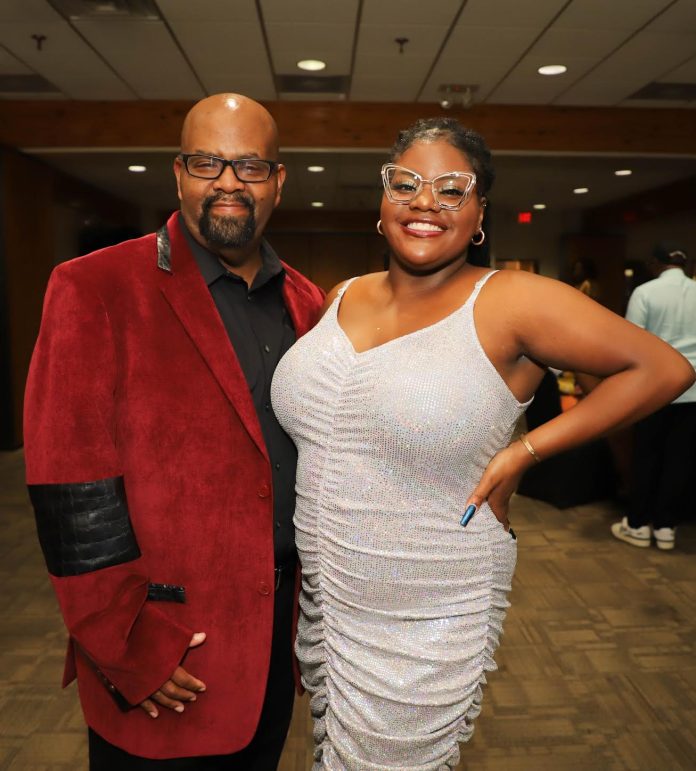
Photo provided by Aria Brent
Aria Brent
Variety Editor
November has many health emphases including Diabetes Awareness and Family Stories month. This provides a perfect opportunity to share my personal experience in recognition of both occasions.
My father and I have always been two peas in a pod. We have the same sense of humor, that causes us to let out the same bodacious laugh. The apple truly hasn’t fallen far from the tree with the two of us.
We’re alike in so many ways that it only makes sense that out of his four children, I’d be the one to be diagnosed with diabetes.
Diabetes is a chronic health condition that occurs due to the amount of glucose in one’s bloodstream. If your body isn’t producing enough insulin, the sugar in your body isn’t being properly absorbed or utilized; thus it stays in the bloodstream and causes elevated blood sugar. There are two types of diabetes. One you’re born with and the other you can develop over time.
I was diagnosed the year after he received a kidney transplant. He was on the move and feeling better than ever. He was working out and eating right. Truly taking advantage of the whole “second chance at life” thing. I had just wrapped up a very full freshman year of high school and was excited to enjoy my summer. I had a gang of friends and an entire schedule of events planned for the next 10 weeks.
In my mind, 15 was too young. I couldn’t even drive yet, how was I supposed to manage my blood sugar? My father apologized as he realized that his genetics played a role in my declining health.
“Having grown up with both of my parents being diabetic, I was in denial when I initially got diagnosed with diabetes,” said my father Luis Brent, a kidney recipient from Columbus, Ohio.
He was diagnosed with diabetes in his mid 20’s and didn’t take the effects of it seriously until his 40’s. First he had complications with his vision as a result of poorly managing his disease. As time went on though, his kidneys failed.
I remember seeing my father as his kidneys failed. He was swollen, tired and unlively. I had never known him to be like this. He was always so animated and engaging. I knew something was wrong when tying his shoes became a chore.
These are the same symptoms I feel when my blood sugar is out of whack. In most cases it runs too high but occasionally when it runs too low, I find myself sluggish and visibly ill. Much like my father, I have a hard time taking my illness serious. Despite seeing him struggle with maintaining his health, I too have found my youth to be an excuse to disregard my health.
My father said when he was first diagnosed, it felt as though limitations were being put on him. Being young and free doesn’t exactly correlate with a strict, low-carb diet.
“All I heard in my head was them telling me what I can’t have,” said Luis Brent.
I’ve also shared this sentiment before.
Never having got the chance to meet either of my father’s parents, all I have is stories and pictures to remember them by. Both of them were diabetic and didn’t live especially long lives. My grandmother died from a heart attack and my grandfather died from other diabetes related complications.
The longer I live, the more I hear just how much I mimic them. I seem to have gained my grandmother’s love for life and my grandfather’s love of food. This seems to be much more than coincidental to me.
Perhaps after years of hearing about them and what they were like, I subconsciously took on some of their best traits. Or perhaps it’s genetics. It could very well be the same gene that has given me an insulin deficiency that has allowed me to embody them.
According to the American Association of Diabetes, type 2 diabetes is oftentimes related to your family history.
For a while, I was resentful of my genes. Every time I had to poke my finger, get up to take my medication or watch what I ate, I was angry. It felt unfair. I remember people asking me, “You’re so young, what happened?” as if me being diabetic was the result of something I had done wrong.
Having to explain to people that I had the average American diet but I just had really strong genes was hard. People looked at me with pity and slight disgust. The fact that I was being judged was so obvious and I hated it. I thought that if I ignored it, everyone else would as well and then it would just magically go away, but that’s not how it works.
It’s been seven years since my father had his kidney transplant and six years since I got diagnosed with diabetes. Nothing has gotten easier for either of us. We have milkshake dates knowing neither of us need them, we still share that same laugh that can fill a room. But most importantly, we hold each other accountable.
I never imagined that diabetes would become something that would get passed down to me. I had family heirlooms and dividends in mind when I thought about what my grandparents would have left for me.
“Diabetes isn’t a death sentence. Addressing the mindset that it’s a restriction and changing the way we view it will help a lot of people,” my dad explained.
Take some this November to look into your lineage. Whether it be for health purposes, to reminisce on your loved ones or for a better understanding of your family history. Learn the importance of what’s flowing through your blood.

